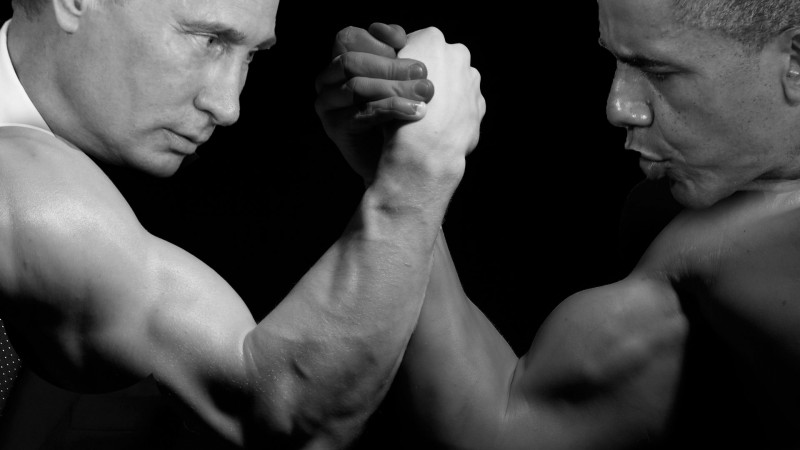
The Kremlin and the White House duke it out over the crisis in Ukraine. Images mixed by author.
The United States placed sanctions on another batch of Russian elites this week. Acting on orders from President Obama, the US Treasury Department added 16 Russian officials and “members of the Russian leadership’s inner circle,” as well as Bank Rossiya, to a list that already included 11 individuals accused of “contributing to the crisis in Ukraine.” (On March 17, 2014, the European Union also levied sanctions against 21 Russians and Ukrainians connected to the Kremlin and the ousted Yanukovich regime.)
The new sanctions list, as the Treasury Department’s language indicates, targets people believed to carry serious influence over Vladimir Putin. Notably, the four “inner circle” business tycoons named by the White House all appear as regular antagonists in anti-corruption reports by jailed blogger Alexey Navalny. (See Andrey Tselikov’s GV article on this subject.) By escalating its sanctions against Russia’s rich and powerful, the US government hopes to send the message that there will be “costs” to the Kremlin’s “provocative acts” in Ukraine.
The vast majority of Russians remains unaffected by the West’s punitive actions. While many in Russia’s liberal opposition welcomed Washington’s move against Putin’s “inner circle,” most are careful to warn against measures that could hurt the whole country. Navalny also objects to wider penalties that “would worsen conditions for our [the Russian] people.” Appeals to foreign powers for sanctions and interventions in domestic affairs have long been a controversy in Russian opposition politics. In the past, liberal figures like Garry Kasparov and Boris Nemtsov lobbied on behalf of the Magnitsky List—another blacklist against Russian elites, meant to impose “costs” on the Kremlin’s behavior.
Unlike Vladimir Putin, the individuals on America’s new sanctions list do not command the adoration of the Russian people. Most Russians probably have no idea who they are, or distrust members of the “inner circle” on principle for their wealth and high office. Perhaps the Obama Administration was counting on the sympathy of ordinary Russians, hoping the public would see US sanctions as blow to Russian autocracy, rather than the Russian people.
So far, it seems the West’s response to the annexation of Crimea has only reinforced Russia’s patriotic frenzy. Immediately following Obama’s announcement about the new sanctions, Russian business-owners began posting humorous signs outside their stores, banning the US President from entering their shops. Internet users soon started posting photographs of these signs, and random people later added their own homemade messages to Obama, banning him from dormitory rooms, cafeterias, and so on. Many of these posts were intentionally absurd, suggesting that the authors meant to mock the effort to “sanction” Obama, while others were plainly racist, indicating that some of the absurdity remained anti-American.

Russian university students forbid President Obama from entering their dorm room. “Don't be offended,” the sign reads, “it's your own fault.” Image anonymously shared online.
If the West hopes to sway Russian public opinion, its attempts to pressure Putin may face challenges even greater than snarky Internet memes. On March 20, the national polling agency WCIOM revealed that Russia’s actions in Crimea have pushed Putin’s approval ratings to a five-year-high, both nationwide and in Moscow and St. Petersburg, where the anti-Kremlin opposition is strongest. (Recent surveys by the Levada Center and Navalny’s new sociological group, organizations less friendly to the Russian government, show a similar rise in Putin’s popularity.)
Might the West further escalate its sanctions against Russia? Indeed, President Obama in his speech today did threaten another round of penalties that “could be disruptive to the global economy.” In other words, ordinary Russians would likely feel the impact of such sanctions, straining individuals’ patriotic commitment to the ruling elite.
In a March 15 Facebook post, conservative columnist Maxim Kononenko entertained this darker scenario, asking readers how they would respond to international isolation. Not surprisingly, given his typical support for the government, Kononenko reasoned that tougher sanctions could force an end to Russia’s capital flight, compelling the country’s consumers and producers alike to buy and invest domestically. “Honestly, the further on things go,” Kononenko wrote, “the more it seems to me that Putin did all this [in Ukraine] simply because he’d lost all hope that he could get Russians to do anything for themselves, instead of investing everything abroad.”
Kononenko’s post attracted 365 “likes,” 58 “shares,” and over 400 comments—most expressing support for the idea of “development through isolation.” Not everyone agreed, of course. For instance, Nikolay Balmasov, an entrepreneur living in Moscow, commented, “We already lived behind an iron curtain once and it was enough. Living in isolation from the whole world with only North Korea for a friend—you can go live in this shit by yourself.”








1 comment
What the West doesn’t understand is that the pain of losing the Crimea, as part of Russia (or losing Mother Russia, as the Crimeans definitely saw it), is ingrained into Russian culture. The idea of non-Russian Sevastopol feels either as an absurd nonsense or a cheat. This return of the Crimea home gave Russian patriotism a great boost.